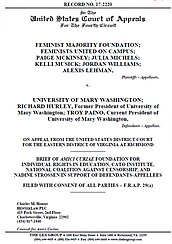Students who disagreed with the feminist activists went on Yik Yak, a now-defunct app that allowed anonymous users to post whatever they like. It turns out that the veil of anonymity encourages people to speak in an unvarnished way, so many of the comments on the app were aggressive, vulgar, and hyperbolic.
The activists demanded that the university administration take action — and some actions were taken (including suspension of the rugby team) — but the university could not very well punish anonymous postings because, well, they were anonymous. The administration pointed out that banning a public forum because of objections to the speech expressed there would be an affront to free speech, which the University of Mary Washington, a public institution, is obliged by the First Amendment to protect.
The activists were displeased and, backed by the national Feminist Majority Foundation, sued the school for failing to ban Yik Yak and otherwise crack down on offensive speech, in alleged violation of Title IX and the Equal Protection Clause of the Fourteenth Amendment. The federal district court granted the university’s motion to dismiss, so the case is now on appeal before the U.S. Court of Appeals for the Fourth Circuit.
Cato has joined an amicus brief alongside the Foundation for Individual Rights in Education, National Coalition Against Censorship, and former ACLU president Nadine Strossen, arguing that the Fourth Circuit should affirm the dismissal of FMF’s lawsuit. The “Yaks” in question are not to our taste, to say the least, but the values of free expression and free inquiry are meaningless if they protect only those things of which we approve. The university behaved reasonably in this instance, taking steps to address legitimate concerns while declining to abridge the most fundamental guarantee of the Bill of Rights.
College students, for all their foibles, are adults who must learn to engage with other adults who disagree, even those who disagree in repulsive ways. To make government officials the arbiters of our values is to invite the capricious judgement of those in power who would impose their own peculiar taste as to which ideas are and are not permissible within their particular jurisdiction.
In Western Europe, you can be prosecuted if you deny the Armenian Genocide; in Turkey, you can be prosecuted for affirming it. When it comes to the First Amendment, where you stand in the eyes of the law should not depend on the jurisdiction in which you sit.
